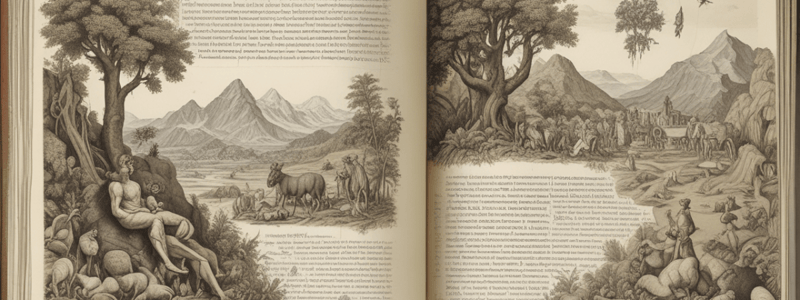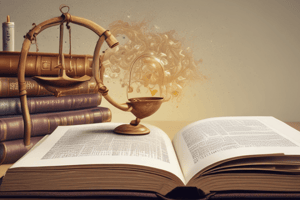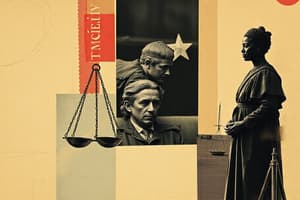Podcast
Questions and Answers
What is the definition of natural law?
What is the definition of natural law?
Idea of a higher moral law that positive law must be measured against and must not violate.
What is the focus of natural law thinking?
What is the focus of natural law thinking?
Elaboration of natural law thinking in Western philosophy.
What are the key shifts in natural law thinking?
What are the key shifts in natural law thinking?
Ancient -> Medieval -> Modern.
What are the two great questions in natural law theory?
What are the two great questions in natural law theory?
What is the status of human law that violates natural law according to classical natural law?
What is the status of human law that violates natural law according to classical natural law?
How is natural law defined in the Greco-Roman/Ancient/Classical perspective?
How is natural law defined in the Greco-Roman/Ancient/Classical perspective?
What does the concept of universal law entail in the classical natural law framework?
What does the concept of universal law entail in the classical natural law framework?
How does the classical natural law view nature and human existence?
How does the classical natural law view nature and human existence?
What is the teleological conception of natural law according to the classical perspective?
What is the teleological conception of natural law according to the classical perspective?
How does classical natural law view the laws of nature?
How does classical natural law view the laws of nature?
What is the relationship between just law and natural law in the Greco-Roman perspective?
What is the relationship between just law and natural law in the Greco-Roman perspective?
Who are believed to possess the wisdom to create a perfectly rational and just order in Plato's 'The Republic'?
Who are believed to possess the wisdom to create a perfectly rational and just order in Plato's 'The Republic'?
According to Aristotle in 'Nicomachean Ethics', what is the role of the judge in solving human affairs?
According to Aristotle in 'Nicomachean Ethics', what is the role of the judge in solving human affairs?
What concept does Aristotle emphasize as necessary for solving human affairs in 'Nicomachean Ethics'?
What concept does Aristotle emphasize as necessary for solving human affairs in 'Nicomachean Ethics'?
How did Roman jurists and orators receive the natural law tradition?
How did Roman jurists and orators receive the natural law tradition?
In the Stoic philosophy, what is Logos and where is it found?
In the Stoic philosophy, what is Logos and where is it found?
What did Plato believe to be the key to understanding nature, justice, and morality?
What did Plato believe to be the key to understanding nature, justice, and morality?
How does Aristotle view the relationship between things in nature and their telos in 'Nicomachean Ethics'?
How does Aristotle view the relationship between things in nature and their telos in 'Nicomachean Ethics'?
Who is the author of 'Leviathan'?
Who is the author of 'Leviathan'?
What is the main purpose of laws according to Thomas Hobbes?
What is the main purpose of laws according to Thomas Hobbes?
What does the social contract entail according to John Locke?
What does the social contract entail according to John Locke?
How does Hobbes describe the state of nature?
How does Hobbes describe the state of nature?
What is the significance of natural law according to John Locke?
What is the significance of natural law according to John Locke?
What rights does Locke associate with the state of nature?
What rights does Locke associate with the state of nature?
Who is the key thinker in theological debates in the 13th – 17th century that set in motion the dissolution of the cosmological tradition in Roman law thinking?
Who is the key thinker in theological debates in the 13th – 17th century that set in motion the dissolution of the cosmological tradition in Roman law thinking?
What did Ockham believe about God's will?
What did Ockham believe about God's will?
What does the concept of a social contract aim to achieve?
What does the concept of a social contract aim to achieve?
According to Ockham, how can humans have access to the eternal law?
According to Ockham, how can humans have access to the eternal law?
How does Locke differ from Hobbes in their views on the state of nature?
How does Locke differ from Hobbes in their views on the state of nature?
What does Hobbes consider as the main purpose of a sovereign power?
What does Hobbes consider as the main purpose of a sovereign power?
What was the key shift in natural law thinking in the 17th and 18th century?
What was the key shift in natural law thinking in the 17th and 18th century?
In which work does John Locke re-interpret natural law in terms of inalienable rights?
In which work does John Locke re-interpret natural law in terms of inalienable rights?
What led to the need for a new universal foundation for law according to the Enlightenment?
What led to the need for a new universal foundation for law according to the Enlightenment?
What are the two principles modern natural law theories are based on?
What are the two principles modern natural law theories are based on?
What was a key feature of the rise of modern natural law in the 17th and 18th century?
What was a key feature of the rise of modern natural law in the 17th and 18th century?
Flashcards are hidden until you start studying
Study Notes
Natural Law
- Defined as an idea of a higher moral law that positive law must be measured against and not violate
- Denotes something independent of human will, not human-created
- Concerned with moral and philosophical principles guiding human action
Key Shifts in Natural Law Thinking
- Ancient period: eternal order of the universe (cosmological)
- Medieval period: divine will/will of God
- Modern period: necessary conditions of human life/reason
Two Great Questions in Natural Law Theory
- How do we discover the natural law?
- What is the status of human law that violates natural law?
Greco-Roman/Ancient/Classical Natural Law
- Natural law is just law, and just law is in harmony with universal laws of nature
- Teleological conception of natural law: nature has an overall design, not random, with a specific purpose
- Universal law is the same everywhere, not dependent on human acceptance
- Examples: acorn seed analogy, order of nature contains universal law
Plato's Natural Law
- The Republic: nature has an Ideal Form that can be realized under the rule of philosopher kings
- Dualistic: eternal (pure) forms vs. the real world (imitation)
- Ideal Forms and Ideas contain justice and morality
Aristotle's Natural Law
- Nicomachean Ethics: rejects dualism, returns to nature
- Everything in nature corresponds to a telos (purpose)
- Humans' telos is to live a rational life of virtue and goodness
- Phronesis (prudence/practical wisdom) helps discover the dikaion (the Right)
Reception of Natural Law in Rome
- Roman jurists and orators followed mainly the Aristotelian tradition
- Stoics: all reality is pervaded by a divine force/cosmic order (Logos)
- Logos is found in the reason of all beings, including inner state of mind in harmony with Logos
William of Ockham's Nominalism
- Rejects abstract concepts and universals (just words)
- God's will is free and absolute, no eternal or natural law binds God
- Humans can only know empirical things through finite human reason, not eternal law
Rise of Secular/Modern Natural Law
- 17th and 18th century: emergence of secular natural law, based on natural rights and social contract theories
- Two principles: human beings have natural needs, and human beings are social creatures
Thomas Hobbes' Natural Law
- Leviathan: starting point is humans in a state of nature, characterized by war, violence, poverty, and isolation
- Natural law prohibits practices that might signal a return to the state of nature
- Social contract: citizens give up power to the State, which has sovereign power to define the right and just
John Locke's Natural Law
- Re-interprets natural law in terms of inalienable, prepolitical (natural) rights
- Natural law provides an objective moral limit on State power and positive law, giving birth to modern human rights theory
- State of nature is a state of perfect freedom, rationality, and equality, with natural rights to life, limb, liberty, and property
Studying That Suits You
Use AI to generate personalized quizzes and flashcards to suit your learning preferences.




